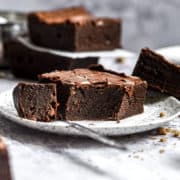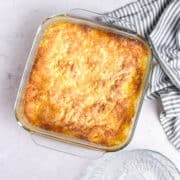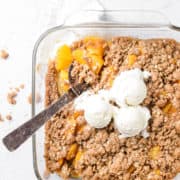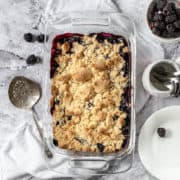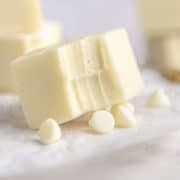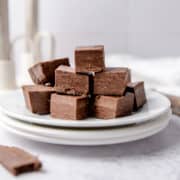Fresh eggs are a staple in many parts of the world and there are lots of ways to cook them, as well as plenty of recipes calling for eggs. It's a good idea to find out how to store fresh eggs because rotten eggs smell and taste awful and can make you sick.

Jump to:
So, if you have some eggs and you're wondering if they're still good, read on for some tips about the best way to store them and how to tell if they're not good anymore.
Just some of the best recipes which need fresh eggs include peach cobbler pound cake, orange cupcakes, and matcha cookies.
If your palate is more savory than sweet, there are also plenty of savory egg-based dishes to choose from, such as deviled eggs, eggs benedict, quiche, omelets, and so much more. I love this egg puffs recipe which calls for the addition of egg whites and hard-boiled eggs.
What are Fresh Eggs?
Fresh eggs refer to eggs that have been recently laid by poultry, such as a chicken, goose, or quail. They are composed of an egg white and a yolk and taste fresher than older (less fresh) eggs. They hold their shape well in baking and cooking and the fresher the egg the more nutrients it contains.
As well as being ideal for both savory and sweet dishes, eggs can be used in sauces, including carbonara and Hollandaise to name just two.
Eggs are a very nutritious option, giving them "superfood" status. They're a nice source of Vitamins A, B2, B5, and B12, selenium, phosphorus, and folate. Vegans might not eat them but most vegetarians will eat them since they're an amazing source of protein as well as being highly nutritious, tasty, and versatile.
Thousands of years ago, way back in the Neolithic age in fact, humans began to consume eggs, and chickens have been domesticated in China since about 6000 BC, making them one of the oldest foods in the world.
There is some confusion about the best way to store them though, such as whether they should be kept at room temperature or refrigerated, and whether unwashed eggs should be stored differently from washed ones.
How to Buy the Best Fresh Eggs
First of all, always open the carton and check all the eggs for cracks, since they're fragile and can crack easily. Rather than check the best-by or sell-by date on the egg packaging, it's best to look for the packing date, which is the number above the sell-by date. Known as a "Julian number" it represents all 365 days in the year. January 1, for example, is 001, while December 31 is 365. The packing date can be up to a week after the eggs were laid.
This means if the packing date is 220, that's August 8, and from there you can add on a week assuming there was a week between laying and packing. If the sell-by date is September 9, more than a week out, you might assume the eggs are very fresh, as the expiration date isn't the same as the sell-by date.
Also, as sell-by dates vary depending on brand, it's best to compare egg cartons and choose the highest Julian number, since those are going to be the freshest.
If you're buying farm-fresh eggs from a local farmers' market, instead of shopping for store-bought eggs, you can just ask the vendor when the eggs were laid. Someone selling eggs from their own chickens should know exactly when they were laid.

How to Store Fresh Eggs
Knowing how to store fresh eggs is very important since the smell of a bad egg isn't something you will want to experience. Also, since there are so many egg recipes, it's worth always having eggs on hand. The following tips should help you decide where and how to store yours.
- Keep whole eggs in the original carton on the middle shelf of the refrigerator. Many fridges come with little plastic egg holders in the door but that isn't the best way to prolong their shelf life.
- In the United States, eggshells must be sanitized in order to qualify as USDA-grade eggs. This strips the natural protective layer or protective coating oils from the shells and means the tiny pores can be permeated by anything strong-smelling in the fridge, so keep them in the carton not only to protect them from breakage but also to shield them against taking on smells from other foods you have in there.
- Eggs purchased in the UK and Europe, for example, aren't sanitized in this way and can be kept at room temperature as long as that's below 68°F, otherwise they're best kept refrigerated.
- Boiled eggs should be refrigerated and used within a week.
Freezing is an option for long-term storage, but don't freeze eggs in their shells because the water content expands when frozen and this can crack the eggshells. Instead, you can break the eggs and then store the whites and yolks combined or store each separately.
Keeping them separate is the easiest way to thaw only what you need, such as only whites for making meringue or only yolks for making a rich sauce.
Let's say you're making meringue coconut cream pie which calls for both egg yolks and whites. That way, you will use the whole egg. If you're making meringues by themselves, you only need egg whites, so you'll have the yolks left over and might not need those for anything right now.
- To freeze egg whites, use ice cube trays or other similar freezer containers.
- To freeze egg yolks, whisk them lightly, adding 1 ½ teaspoon of white sugar and ¼ teaspoon of salt for every 4 egg yolks. Omitting the sugar and salt means they won't freeze well and the yolk will gel, rendering them inedible upon thawing. Freeze them in an airtight container or use ice cube trays if you prefer.
- Don't freeze boiled eggs because the whites turn chewy and watery when you thaw them.
Raw eggs can be frozen for up to a year, but it's best to use them within 4 months for the freshest flavor.
How to Tell Whether Eggs Are Bad
Once you have smelled a rotten egg, you aren't going to forget the horrible aroma in a hurry! But how do you tell whether your grocery store or fresh farm eggs are spoiled without cracking them open? Fill a pot or similar with cold water and put the eggs in there.
If the egg stays at the bottom, it's fresh. If it sits up but still touches the bottom, it's quite fresh. If it floats it's gone bad and should be discarded. The oldest eggs, those that float, aren't going to smell or taste good, although older eggs which sit on the bottom and don't float should be fine.
The reason bad eggs float is the air sac gets bigger the older the egg gets. This is the best method to check how fresh or otherwise your eggs are. Even "farm fresh eggs" can be older than you assume, so it's worth always doing the float test.
Common Questions
Although most of us would consider the pointy end the top of the egg, look in a carton of eggs and you should see they're rounded side up. The reason for this is there is an air bubble in the larger end and this helps keep the yolk central and also helps them stay fresh longer.
It's recommended that immunocompromised people, children, pregnant women, infants, and the elderly avoid lightly cooked or raw eggs since they might have salmonella bacteria which can make them sick.
The advice used to be that nobody eats raw or undercooked eggs (or dishes made with raw eggs like Caesar salad dressing) but today's improved farm hygiene and egg production methods, chicken vaccinations, better salmonella testing, rodent control, and keeping the eggs cold while transporting them means that they should be safe to consume, but of course, it's your choice!
Also, the USDA recommends you don't eat unpasteurized raw eggs because they are riskier than pasteurized ones. So, if you have farm-fresh eggs or even your own backyard chickens, you'd better cook the eggs throughout to be on the safe side.
A cold egg isn't the best choice if you're baking. In fact, for almost all baked recipes with eggs, the recipe will call for room-temperature eggs, but why is this? Well, the temperature of the eggs affects the texture, taste, and structure of baked recipes.
You can either leave the eggs on the kitchen counter for an hour or put them in a bowl of warm water (think shower water temperature) for about 5 minutes or until you can hold one without it feeling cold in your hand.

Did You Know?
- An egg skelter is a great way to store a number of eggs (usually 2 dozen) and you can put them in there in order of age, to ensure you use the oldest eggs first.
- The term "free range" means the hens have access to an outdoor area as well as their nesting boxes, but there are no rules about how the area should be, so it's a bit of a misleading term and a reason why many egg lovers prefer to purchase their eggs from local farmers' markets.
- Bacteria from eggshells can contaminate other eggs, so never reuse egg cartons for clean eggs or store boiled eggs or other foods in there.
Once you know exactly how to store fresh eggs to keep them fresh and safe, you might want to expand your egg recipe repertoire and try out some new egg dishes.







